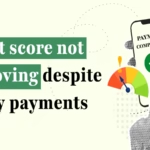If you’ve ever applied for a loan or credit card, you’ve probably heard the terms credit score and credit report. But most people—especially first-time borrowers—confuse the two or assume they’re the same thing. Spoiler: they’re not.
In fact, understanding the difference between a credit score and a credit report can be the deciding factor in whether your loan gets approved or rejected, whether you pay 9% interest or 15%, and even whether you get that dream apartment on rent or not.
Let’s break it down in a super simple and detailed way that even your non-finance friend can understand.
-
What Is a Credit Report?
A credit report is like your financial biography.
It’s a document prepared by licensed credit bureaus (like CIBIL, Experian, Equifax, and CRIF High Mark in India) that records your entire credit history. Basically, if you’ve ever taken a loan, owned a credit card, missed an EMI, or applied for credit—it’s all in there.
🔍 What Does It Contain?
✅ Personal Information: Name, PAN, Date of Birth, Address, Contact details
✅ Credit Accounts: All loans (home, personal, vehicle), credit cards, BNPL services
✅ Payment History: Whether you’ve paid EMIs on time, missed due dates, defaulted, etc.
✅ Credit Utilization: How much of your credit limit you’re using
✅ Account Status: Closed, active, settled, written-off, etc.
✅ Inquiries: Records of all lenders who have pulled your report recently (called “hard inquiries”)
✅ Defaults or Collections: If your dues have been sent to recovery or legal action
-
What Is a Credit Score?
If the credit report is your biography, your credit score is your performance rating—a 3-digit number ranging from 300 to 900 that sums up your entire report.
The higher the score, the better. A good credit score shows that you’re responsible with credit, while a poor score suggests you’re risky to lend to.
What Affects Your Credit Score?
✔ Payment History (35%) – Most important. Late or missed payments drop your score
✔ Credit Utilization (30%) – Using over 30% of your card limit? That’s a red flag
✔ Credit Age (15%) – Older credit accounts show experience and boost your score
✔ Credit Mix (10%) – A mix of secured (like home loans) and unsecured credit (like credit cards) helps
✔ Hard Inquiries (10%) – Too many recent loan/credit card applications? Your score takes a hit
-
Credit Score vs Credit Report: Side-by-Side Breakdown
| Factor | Credit Score | Credit Report |
|---|---|---|
| Type | 3-digit numerical rating | Detailed document |
| Purpose | Snapshot of creditworthiness | Full credit history |
| Maintained By | Credit Bureaus | Credit Bureaus |
| Used By | Banks, NBFCs, Landlords, Employers | Same, but for deeper evaluation |
| Contains | Summary (number) | Full account details, missed payments, etc. |
| Updated | Monthly | Monthly or quarterly |
| Affects What? | Loan approval, interest rates, etc. | Underlying data that affects the score |
| Can Be Wrong? | Yes (if based on incorrect report data) | Yes (mistakes happen, and they hurt your score) |
-
Why This Knowledge Matters in 2025
In 2025, almost everything is digital and credit-driven. From instant personal loans to BNPL apps and car financing, lenders are now using AI-backed credit systems to scan your profile and approve/disapprove loans in seconds.
Even job applications, insurance, and rentals are starting to use credit history checks.
If you don’t monitor your credit report, an error can drag your score down—and you might never know why your loan was rejected.
-
How to Access Both in India
You can check both your credit score and full credit report for free once a year from each credit bureau. Here’s how:
- Visit CIBIL, Experian, Equifax, or CRIF High Mark’s official site
- Enter your basic details (PAN is a must)
- Authenticate via OTP
- Download your credit report instantly
- Use apps like Paytm, OneScore, or CreditMantri for free score tracking
-
Real-Life Scenario: Why Both Matter
Imagine you have a credit score of 720—looks good, right?
But when you check your credit report, you discover an old loan you never took under your PAN. It’s a case of identity theft.
Until you raise a dispute and correct the report, your score will keep dipping. That’s why checking your report is not optional—it’s essential.
-
Tips to Keep Both in Top Shape
✅ Pay all EMIs and credit card dues before the due date
✅ Keep credit utilization under 30%
✅ Don’t close old cards (they help with credit age)
✅ Avoid applying for multiple loans at once
✅ Regularly check your credit report for errors or fraud
-
Myths Busted
Myth 1: Checking your own credit score lowers it
Fact: That’s only true for lender “hard pulls.” Your self-checks are “soft pulls”—they don’t impact your score.
Myth 2: You only need to care about credit score when applying for a loan
Fact: Credit mistakes or fraud can sneak in anytime. If you wait till you apply for a loan, it’s too late.
-
Final Thoughts
Your credit score is the number banks use to judge you.
Your credit report is the evidence behind that judgment.
You need to monitor both regularly, especially in 2025 when digital finance is at its peak and one tiny mistake can cost you thousands.
Be financially smart. Be credit-aware. Keep your report clean and your score high—and you’ll unlock better loans, lower EMIs, and a stress-free financial future




